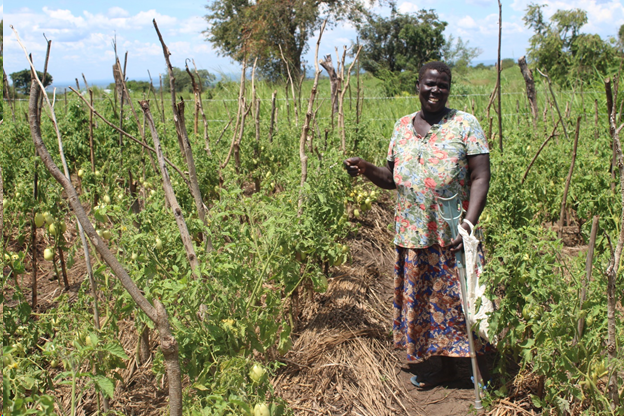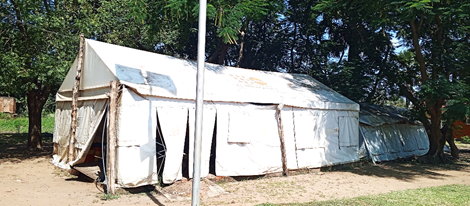DRDIP’s inclusive project motivates persons with disabilities
Persons with disabilities in Maaji III Block Refugee Settlement, Adjumani district are grateful to the Office of the Prime Minister (OPM) for granting them equal consideration to benefit from development project initiatives funded by the World Bank.
Cezirina in her tomatoe garden at the settlement
Kevin Cezirina 40, and her group members who benefited from a livelihoods enhancement sub-project under the OPM’s Development Response to Displacement Impacts Project (DRDIP) have spoken out loudly, and with joy.
Cezirina has achieved two milestones. She has been able to pay school fees for her two grandchildren whose parents vanished during the 2014 South Sudan war. “I am also not complaining about feeding because of the strength DRDIP gave me, to be able to stand alone, we couldn’t continue relying on food distributed by the UN because it is not enough for the large number of refugees”, she noted.
Cezirina is one of the beneficiaries of Maaji III Block A, Refugee Settlement Small Scale Irrigation Scheme that was started in 2021 with support from DRDIP. Of the 95 members, 15 including Cezirina are considered persons with disabilities.
The group owns two acres of land where they have been planting vegetables and fruits like: Onions, Tomatoes, Egg plants, Sukuma wiki, green paper and water melon. They harvest seasonally and get profits that keep their group savings growing and enable their households to run.
The group received Shs156 million from DRDIP and has been getting technical support from Agri Farm Uganda Limited. At initial stages, each member would receive a modest pay of Shs4,000 daily after working in the small scale irrigation farm. They maintained a mandatory saving of Shs1,500 that they plan to jointly start up a Savings and Credits Cooperative (SACCO) when DRDIP closes. Individual members have also been able to set up their own farms to bolster household feeding and income.
Cezirina says including her amongst
the beneficiaries of the project has helped build her confidence and empowered
her financially and socially.
“Persons with disabilities are no longer portrayed as idle or lazy because we are able to work and sell produce to the community”, she said.
As for Christopher Ataba, the Chairperson Project Management Committee, “the beneficiaries have gained knowledge, skills and confidence through training, mentorship and capacity building by AgriFram”.
“Working together here has inspired
us to dream bigger and we want to become role model farmers”, Christopher said. “We
get invited for different meetings at the district headquarters and in town,
these meetings allow us to interact with many people and get knowledge”, he
added.
Mark Akuti, another grateful member of the group, said, “we feel empowered by the project and even if DRDIP is not there, we shall exist and even grow bigger”.
Projecting himself as, “a visionary farmer”, Akuti said he wants to become the number one supplier of vegetables in Ma’di sub –region, stating that “Obongi district is already one of my market places today outside Adjumani”.
Akuti says DRDIP helped him to network with other organizations during exchange visits. “It is now very easy for me to lobby for support from other organizations, because I have their contacts”.
Persons with disabilities who leave their countries find themselves in destitute circumstances due to their limitations to do certain tasks so as to earn a living. They are often unnoticed and little effort goes into securing for them special treatment when they enter a foreign country.
DRDIP addresses the needs of all people and pays special attention to vulnerable groups through their inclusive approach to beneficiary identification.
Maaji refugee settlement is home to
about 40,000 predominantly South Sudanese nationals. As of January 2023, Uganda
was among the largest refugee hosting countries in the world with a refugee
population of 1,501,552. Of these, 112,510 are registered as persons with
disabilities as per data from UNHCR.





Comments
Post a Comment